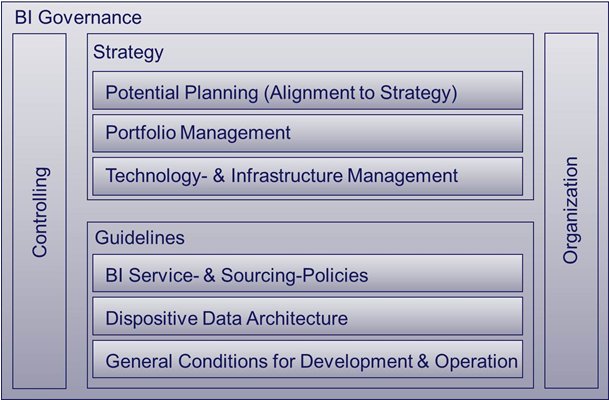For further information, please contact our expert.

BI Management ensures the management and steering of business intelligence and of the organizational units involved as well as the integration into an existing expert, technical and organizational BI environment. In order to ensure optimum implementation, we recommend developing a BI strategy as well as putting in place corresponding BI governance with a BI Competence Center.

BI Management is an important success factor for BI implementation projects. Often enough, the project scope is implemented but the BI overview and the corresponding interdependencies are neglected. This can be avoided thanks to sound BI management.
BI governance defines the rules according to which business intelligence is steered, organized, implemented, and developed further. BI-relevant activities need to be coordinated. The organizational structure, processes, and applications design must be defined; the resources and skills required must be identified and the corresponding systems made accessible. BI governance must be aligned towards strategy.
Further important components of a successful BI solution are interaction between business and IT, requirements management, information life cycle management, and data stewardship (data quality assurance) as well as information stewardship (information quality assurance). A central component of BI governance is the definition of uniform superordinate BI standards from an expert and technical perspective (BI guidelines). BI definitions can then be derived from these guidelines for use within the company.

BI awareness describes the company-wide understanding of BI. Uniform and consistent BI understanding forms the basis for successful BI projects. In a first phase, the prevailing BI understanding within a company as well as the BI stakeholders in management, expert fields, and IT are determined. In a second step, targets and gaps are analyzed and on the basis of this, concrete measures are defined, e.g. written definitions and communication methods.
A BI strategy ensures the well-targeted development of business intelligence in line with corporate goals. A BI strategy must be developed, adapted, and updated continuously. CubeServ recommends an ambition-driven strategy, i.e. the identification of the ambitions of the BI sponsors and based on this, the definition of the strategy-relevant initial situation according to which concrete goals can be derived. A roadmap based on the BI strategy should define strategic and operational goals and deadlines as well as deadlines for the implementation of an application landscape, a system architecture, and a software portfolio. The individual plans and projects, including measures, are to be laid down in detail in a master plan.
(BICC – BI Competence Center) – Aufbauorganisation
The BI Competence Center is an organizational unit that, ideally, will be a service-providing division that is part of a certain management field. Depending on the organizational structure of a company, different variants are possible, e.g. a virtual BICC. BICCs serve as Single Point Of Contact for all BI-relevant topics, inquiries, and projects. The BI responsibilities and interfaces as well as the BI stakeholders are laid down in the BICC concept and organizational chart that defines company-specific roles and functions as well as communication and escalation measures. A BICC thus provides a solid organizational framework for the successful and comprehensible management of your BI project.
BI requirements engineering is one of the most important and difficult tasks of BI projects. We can support you with regard to the identification of BI-specific requirements and their distinction from other projects. Written documentation in form of a catalogue of measures, comprising all technical and expert requirements, is part of this task. According to our experience of many years, further important elements are feedback loops for quality assurance as well as effective BI management communication.
BI coaching helps to ensure a high implementation quality of BI projects and initiatives. As a rule, BI coaching is carried out during specific project phases or in the long term, to support a specific initiative. BI coaching is particularly important during the initial phase of BI strategy and BI governance design and development. BI coaching can, however, also prove to be the backbone for project success during the challenging phases to follow.
In the field of BI management, we would take pleasure in supporting you with regard to the development of individual aspects according to best practices as well as scientific approaches. We can also be of assistance in the case of a short term lack of resources or with regard to ad interim management.
